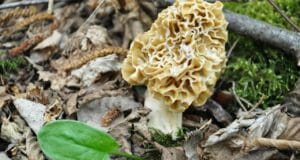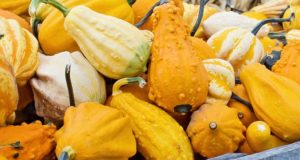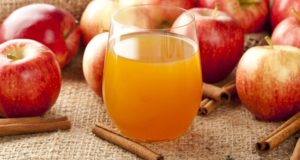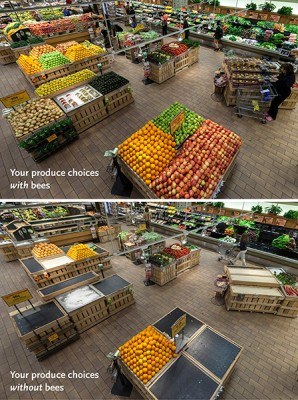 Bees have been dying in record numbers since about 2005, and Whole Foods Market recently embarked upon a “Give bees a chance” educational promotion to highlight the ongoing decline.
Bees have been dying in record numbers since about 2005, and Whole Foods Market recently embarked upon a “Give bees a chance” educational promotion to highlight the ongoing decline.
The chain hosted events in its stores June 21 to alert shoppers to exactly how aisles would look if honeybees no longer existed and also released dramatic pictures showing Americans what grocery stores would look like if colony collapse disorder continues.
Whole Foods highlighted the bee decline last year with a spotlight on produce, and this year took a look at the dairy aisle.
“Imagine a world with no milk, yogurt, or butter. No cheese? No chance. Without pollinators, the dairy aisle would be a lot less plentiful,” the company said in a press release. “That’s why the Whole Foods Market Lynnfield store in Massachusetts demonstrated to shoppers how many of their dairy department favorites would cease to exist without bees.”
One of “every three bites of food” comes from plants pollinated by honeybees and other pollinators, the company said.
Its examination of the dairy aisle found that:
- Without bees, “most fruit-flavored yogurts would be gone.”
- Bees are responsible for “the chocolate in chocolate milk.”
- Without bee-pollinated clover and alfalfa there might be “up to a 50 percent reduction in milk products.”
- Bees sustain “the plant communities where animals graze for cheese production.”
- Almond milk and fruit juices are possible only because of bees.
In 2013, Whole Foods engaged in a similar bee education project and found that 52 percent of its produce – 237 of 453 products – would not be available if it weren’t for bees.
The Ultimate Guide to Keeping Stronger Colonies and Healthier, More Productive Bees
Produce that would not be available includes:
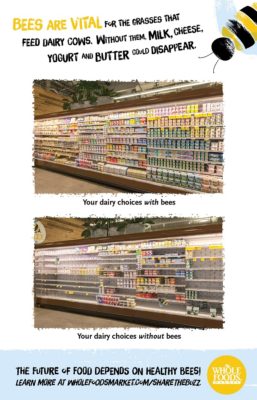 Onions
Onions- Apples
- Avocados
- Carrots
- Mangos
- Lemons
- Limes
- Honeydew
- Cantaloupe
- Zucchini
- Summer squash
- Eggplant
- Cucumbers
- Celery
- Green onions
- Cauliflower
- Leeks
- Bok choy
- Kale
- Broccoli
- Broccoli rabe
- Mustard greens
Whole Foods partnered with the Xerces Society in the study. Said Xerces Assistant Director Eric Mader:
Despite the critical role they play in sustaining our world, the situation for pollinators continues to be difficult. Whether we are looking at honeybee declines, the massive downturn in monarch butterfly populations, or the risk of extinction now facing many bumblebee species, this is an incredibly tough time for pollinators. The stand that Whole Foods Market is taking to bring more attention to our pollinators should inspire all of us to speak out for these creatures, and to take action.
A picture (or a video) is supposedly worth a thousand words. If the astounding images and videos created by Whole Foods Market follow the old adage, perhaps more than a minority of Americans will begin thinking, talking and acting to save the honeybees. To join the bee conservation conversation in cyber space use the hashtag – #ShareTheBuzz.
Whole Foods released tips on saving the bees. The tips included:
- Buy organic: “Buying organic is one of the easiest ways to support pollinator health by reducing the number of harmful pesticides that can adversely affect bees.”
- Don’t use insecticides. “Insecticides are harmful to pollinators, and weed killers reduce food sources by removing flowers from the landscape.”
- Plant bee-friendly organic native wildflowers to “provide forage for honeybees and other pollinators.”
According to the studies reviewed by Whole Foods and Xerces, about 85 percent of all the plant species on Earth either require or “strongly benefit” from pollination by insects.
What do you believe is responsible for colony collapse disorder? Let us know in the comments section below.
Sign up for Off The Grid News’ weekly email and stay informed about the issues important to you
 Off The Grid News Better Ideas For Off The Grid Living
Off The Grid News Better Ideas For Off The Grid Living



